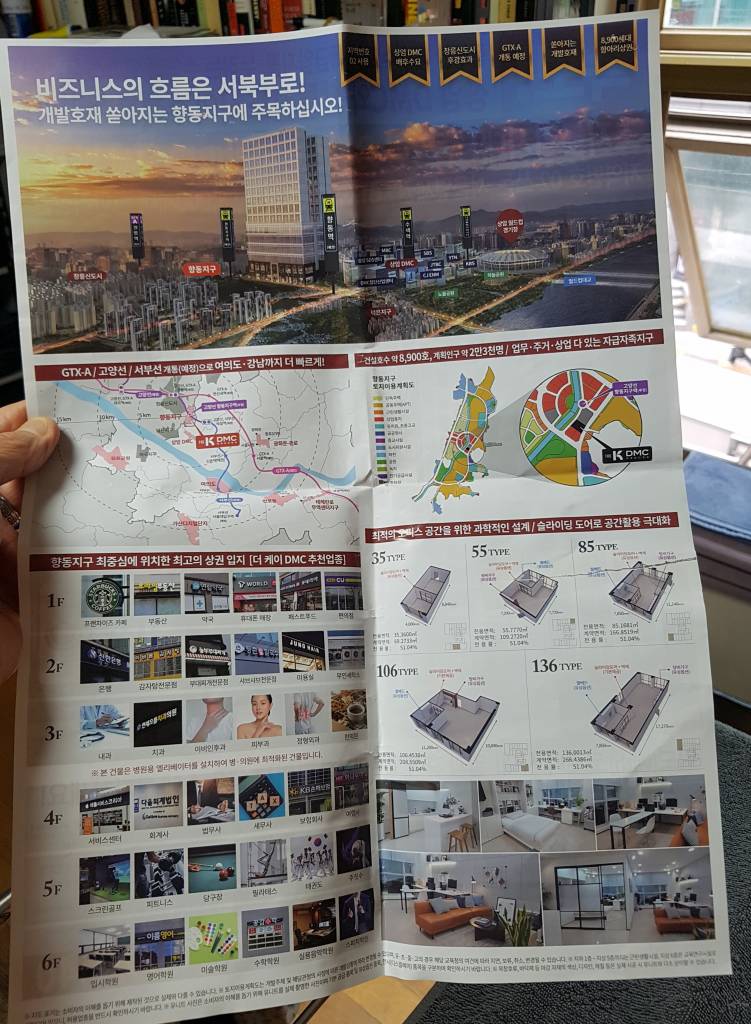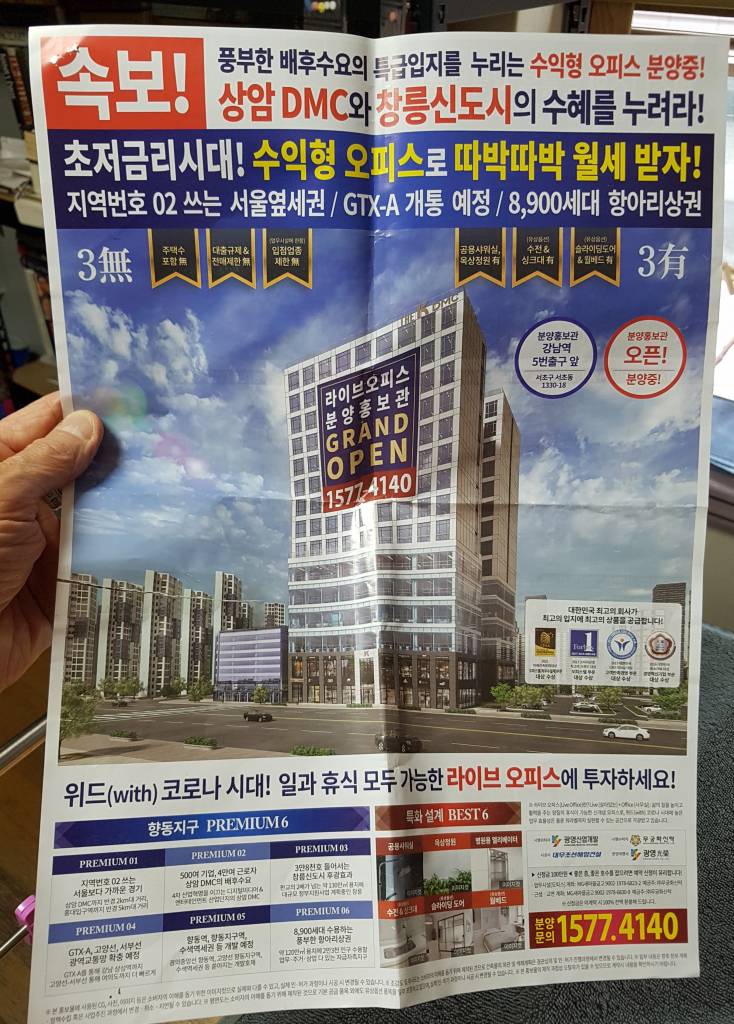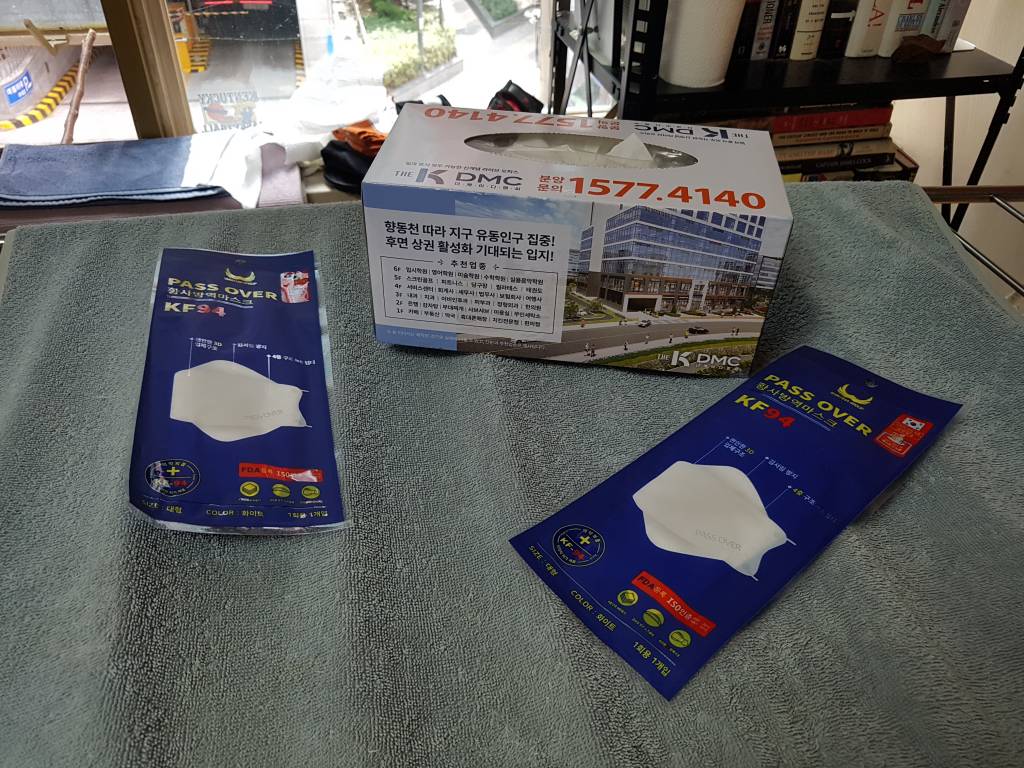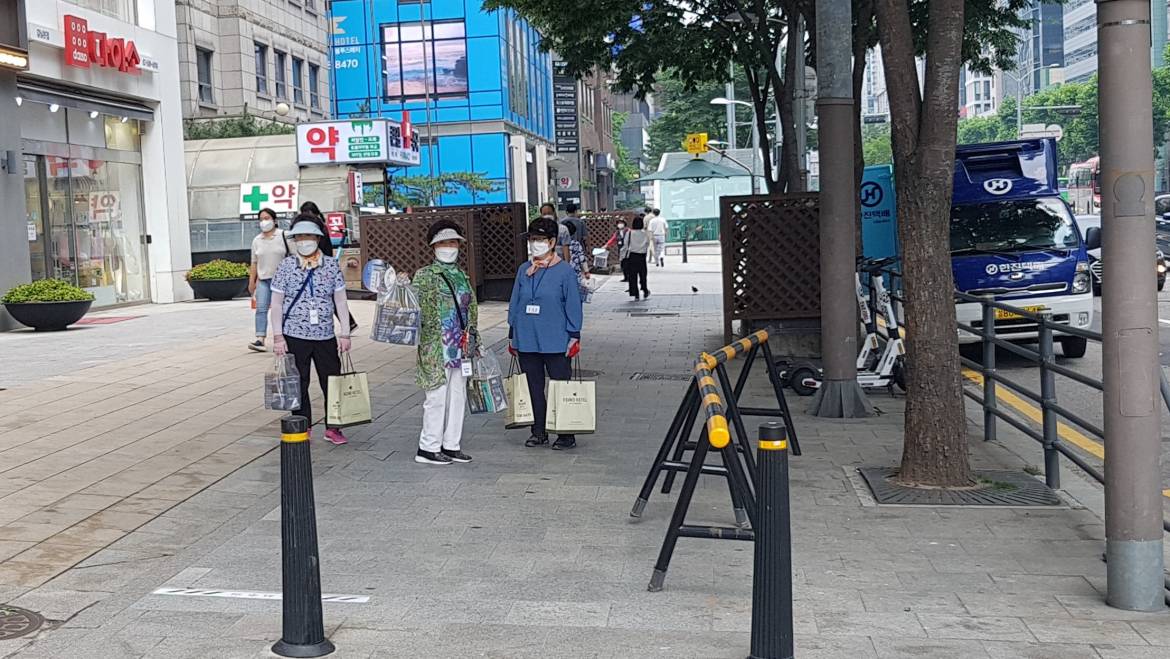After lunch four days ago, Yong Yoon and I took a stroll along Gangnam Street south of its intersection with Teheran Street. I knew that among the people on those busy sidewalks, we would see some ladies a few years past their primes doing a job from which they derive little money and even less satisfaction.
Employed by real estate companies with offices in the area, they stand holding gift bags meant to entice potential customers. Here’s what they do: They approach a person, bow slightly, say a few words urging him or her to accept the gift (which consists of nothing more than a box of tissue paper and two masks) and then ask him or her to visit the office for a quick, no-obligation talk with an agent. They are almost invariably turned down—not just turned down but ignored and bestowed with a scowl. It is painful for me to witness these interactions. Yes, the ladies are somewhat bothersome. And yes, these busy Seoulites are not inclined to deal with them or go talk to a real estate agent. It seems that if they desire to purchase a new apartment, office or officetel, they can find other ways.
The disdain they show these elderly women upsets me. I often told Mr. Yoon that we should go through the motions just once to learn more about them. By the way, they never approach me; as an obvious foreigner, I am not perceived as a good candidate. They go straight to him, however. Several weeks ago, one came to him, shoved a gift bag at him and said imploringly, “Save me!” Perhaps she was being melodramatic, but I fear that her desperation was real.
At my urging, we proceeded with the plan. A woman whom I will call Ms. Park walked up to Mr. Yoon and went through her usual routine. She must have been amazed when we stopped and talked to her, showing some (fake) interest in the real estate development she was touting. “It will only take three minutes,” Ms. Park assured us. “The office is just around the corner. Please come with me.” We did, but in the process we asked a few questions. She was 65, had been on the job for about two years and did not get many customers on the sidewalks of Gangnam Street. (We already knew the answer to that one.)
She brought us to a nice office where we signed a register. Before another word could be spoken to Ms. Park, she was handed a new gift bag and told to return to her labors. Mr. Yoon and I were escorted to a desk behind which sat a young man named Kim Ryu-min. I have to say, I liked him. He spoke well, maintained eye contact with both of us and clearly had a firm handle on this real estate issue. Mr. Kim was a bit aggressive, but I was not offended. He told us all the reasons why we should take advantage of the opportunity to buy into a 14-floor building called K-DMC. I was surprised to learn that it is still under construction and is located in somewhat distant Mapo-gu. The entities behind K-DMC are Kwangyoung Industrial Development and Mugunghwa Trust Company. None of this mattered, of course, since Mr. Yoon and I were not about to buy—Mr. Kim actually urged us to borrow money from a bank and then buy—a unit in that building. Neither of us asked a single question, just politely nodding our heads once in a while.
The only questions I had in mind pertained to Ms. Park and the other forlorn women who stand on the sidewalks in heat, cold and rain, working for real estate companies like Mr. Kim’s. I might have asked, how much do you pay them? Do you think they are treated fairly? And, is this really an efficient way of getting new customers in light of the fact that virtually all the people ignore and scorn them? We excused ourselves and departed Mr. Kim’s office, leaving him to wonder about the true purpose of our visit.
More than 47% of Korean women aged 65 and older are below the poverty line. That rate has improved slightly in recent years, but it is still an appalling fact that the country’s elderly poverty rate is the highest among OECD members by a large margin. What continues to go up, however, is the suicide rate among older Koreans—although men snuff it more often than women.
I feel deep compassion for Ms. Park and women like her who endure rejection after rejection on those sidewalks. For them, every day of survival is a victory of sorts. I respect them for doing the best they can in a precarious situation.
It seems that everything in Korea—universities, washing machines, restaurants—is given a rating, and I will do so here. At the top I would put cleaning ladies such as those at the Halla Classic Building (whom I have honored each Christmas since 2012). They work indoors and get a paycheck that may be small, but it is steady.
Next, I think, are those wrinkled but beautiful women who sit in markets or near subway exits, selling lettuce, garlic, tomatoes and related produce; I sometimes buy stuff from them that I do not truly need.
Then come the ladies like Ms. Park.
Fourth in this sad ranking are the pyeji jumneun sarams or “trash pick-up persons.” This is primarily a male occupation, although I have seen quite a few women out there gathering paper, cardboard and anything of possible value, then lugging it to the local recycling center. While the pyeji jumneun sarams perform a valuable service, that is a very hard way to make a living.
Finally, we come to the bottom of the barrel, the most pitiful of all—the Bacchus ajummas. These women, ranging in age from their 50s to their early 80s, solicit old men in places like Tapgol Park and Jongmyo Park. They arrange deals for cut-rate sex in dingy motels nearby.


Advertising for K-DMC, part 2….



9 Comments
sad commentary
poverty can happen to anyone
but these poor souls……
please go see this related book review:
https://www.texasobserver.org/hard-labor
Sad indeed, Tom…
Your story surprised me widely, provoking some questions and remarks: first, what a shockingly weird way of promoting real state investments! (is it a sort of tradition? are there some limits for other kind of promotions?; second, why investors choose elder women to do so? (again, is it a sort of tradition? are there government bonus for contracting them? and third, how alarming statistics about poverty among elder Koreans!
Oh, I agree, Victor. I watch this sidewalk stuff and am just puzzled…why? what? huh??
Richard, your essay provoked many questions and emotions in my heart and brain. As a resident of an American community 6,560 miles from Seoul, I have no frame of reference to judge the predicament of these ladies. My deep Lutheran faith, however, causes me pain because I can do little – if anything – to ameliorate the plight that advanced life has dealt to Korea’s vulnerable citizens. Were they on the streets of my village, I would certainly speak politely and gently with them, give alms (I benefit from a ridiculously generous public school pension supplied by the corrupt government of the state of Illinois), offer them sustenance, and promise to pray for their eternal welfare.
Americans believe that in Asia there is reverence for the aged that does not exist here. One can only hope that Mr. Pennington’s experiences with these gals is an anomaly.
No doubt, you would recognize them and speak respectfully to them…in Korea, the reverence for the aged to which you refer is gone…with a few exceptions, of course…Korean society changed too quickly and fundamentally
While reading your report, one really has the feeling that the edge of society is depicted here and one doesn’t really know what to do with it. The suicide rate concerns me and you want to take somebody by the shoulders and shake them. These poor women seem to have become a burden on society in their old age and, on the contrary, are not appreciated or valued at all. No trace of respect or the like. On the contrary. The question also arises in my mind, why do they use these women to lure new customers? Because they are cheap? Because they are the only ones who want to do this degrading job? This exposes them even more than they need in their situation and should be done to them. There is something wrong in society. There is no place for these women anymore. They no longer have a role, indeed they no longer play a role in society. Everything has changed so quickly, away from the former model with the grandmother as the keeper of traditions and guardian and advisor for the grandchildren. Life has changed, society has changed and they are left.
Society should appreciate them more and provide better retirement benefits and opportunities to be meaningfully engaged and involved.
Sabine, you are right….it is heartbreaking to witness…these ladies merit respect in every way…instead, they do meaningless work and are ignored….
After reading your article I looked up on the Intrnet to learn about those ajummas. Interestingly there wasn’t single piece of writing about them whatsoever. Nobody, including me, has ever paied attention to them even the slightest bit! Having read the article, when I happen to pass by other ajummas on the street will I give them a pitiful look? Oh, come to think of it, I, once asked an ajumma for the gift bag and she turned me down when I said I didn’t want to follow her to the office, I just wanted the free gift.
Add Comment